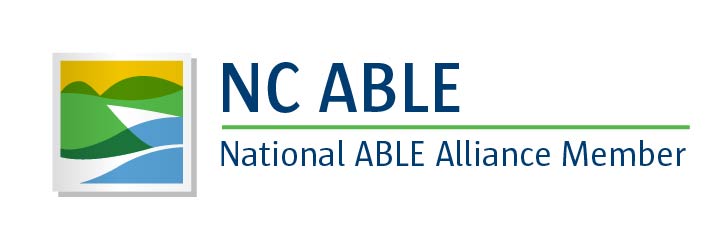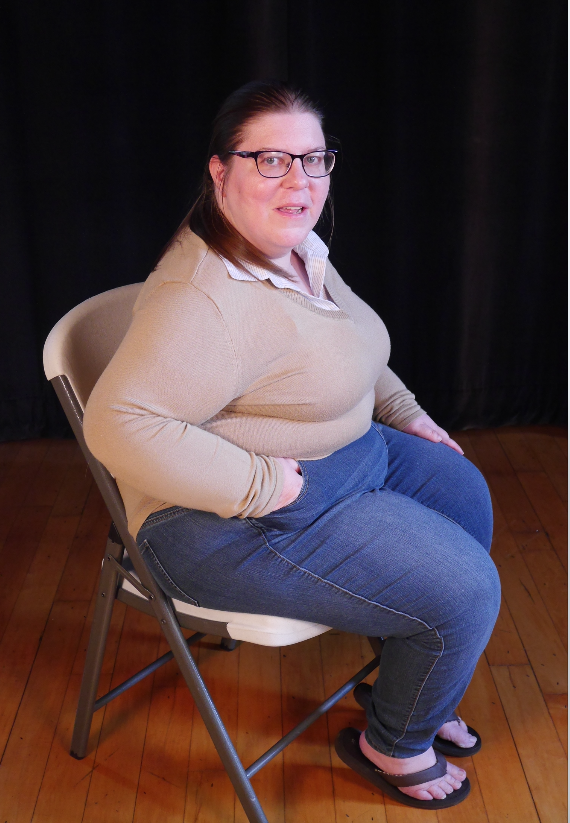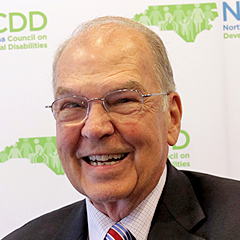January 2017: Highlights and Hot Topics

A Message from Our Executive Director
A new year means building on the work already started and new opportunities! The members and staff of the North Carolina Council on Developmental Disabilities (NCCDD) are very excited about what the new year will bring.
2017 marked the beginning of NCCDD’s new Five Year Plan which will focus on asset development, community living and advocacy development. The Council will herald new initiatives to continue our work around the State, and will soon be promoting ways for the community to get even more involved.
Another great start to the new year is the launching of ABLE Accounts in NC! We are hopeful and optimistic about how this new tool that will help people to better manage and increase their assets. The NC ABLE officially launches on January 26, 2017. The availability of NC ABLE accounts is a great step towards asset development for people with disabilities. More details are shared below in our newsletter.
We also started the year off on bittersweet note. After years of services as the Council chair, Ron Reeve announced his retirement. His dedication and diligence to make the State more inclusive and integrated for people with intellectual and other developmental disabilities (I/DD) has set the example of what true leadership can achieve. We thank Ron dearly for his service, and wish him all the best in his retirement.
Here’s wishing you all a successful and happy 2017!
Chris Egan
Executive Director
STATE
Legislative - The NC Legislature will convene on January 25th. Senator Phil Berger continues as President Pro Tempore of the Senate and Representative Tim Moore continues as Speaker of the House. What was anticipated to be one of the first tasks of the session, redrawing legislative districts, is temporarily on hold waiting decision from the courts.
The I/DD Caucus will continue to be an avenue for the Council to provide education and objective information about what supports are needed for people with I/DD to live healthy lives in the community.
Administrative - Governor Cooper is in the process of appointing his Cabinet. One appointment of particular interest is the Secretary of Health and Human Services. The Governor recently appointed Dr. Mandy Cohen, who formerly served as the Chief Operating Officer and Chief of Staff with the Centers for Medicare and Medicaid Services (CMS). Dr. Cohen’s expertise in Medicaid policy and services will be a great asset to our State. This appointment, as well as others, will have to be confirmed by the Legislature. This process has yet to be developed. Once the new DHHS secretary is confirmed, the Council will reach out to set up a time to meet.
Earlier this month, Governor Cooper made a request to CMS to expand Medicaid under the Affordable Care Act. Legislative leaders subsequently filed a lawsuit to prevent this expansion. A federal judge judge granted a temporary suspension of the expansion.
Mental Health/Developmental Disabilities/Substance Abuse Services System
Innovations Waiver - We continue to monitor the implementation of the changes to the Innovations waiver. Disability Rights North Carolina (DRNC) recently developed videos that explain the waiver and how budgets are determined through the new Resource Allocation method. The videos are easily accessed on DRNC website: http://www.disabilityrightsnc.org
The Division of Medical Assistance (DMA) has been working with stakeholders to develop a state plan definition for Research-Based Behavioral Health Treatment Service for Youth with Autism Spectrum Disorder. The definition was recently presented at public forums and will be sent to CMS for approval. Once approved, this service will allow children and youth with autism spectrum disorder (up to age 21) who are Medicaid-eligible to receive treatment and supports. This will significantly increase access to appropriate services for individuals with autism spectrum disorder.
FEDERAL
Congress advances the process to repeal the Affordable Care Act
The House and Senate both passed a 2017 Budget Resolution which may be a vehicle to repeal portions of the Affordable Care Act (ACA). A Budget Resolution is a blueprint, or non-binding document, that will not be signed by the president or become law. However, this budget resolution contains “reconciliation instructions” to four committees allowing repeal legislation to be fast-tracked. This process allows repeal and/or changes to qualifying components of the ACA to move through the Senate with a majority vote of 51 and is not subject to filibuster.
There has been a lot of misinformation out there: The ACA is still law at this point. However, Congress has created the process by which a repeal of major components of the ACA can happen. This was not a vote to repeal the ACA itself.
For a quick list of ACA provisions that are most important to individuals with I/DD (developed by The Arc of the US), click here.
How the ACA repeal process can affect funding of other programs:
The Budget Resolution reconciliation instructions (see above) that give four committees the authority to propose changes to the ACA were written broadly. It requests each of these committees to identify $1 billion dollars in savings over 10 years. These proposed budget changes could be passed by a simple majority of 51 votes. These committees have been asked to identify savings or cuts by January 29, although we think that will likely get pushed back. The committees named in the Budget Resolution are listed below with a sample of the disability programs they oversee.
- House Ways and Means: Social Security, SSI, Medicare
- House Energy and Commerce: Medicaid, Developmental Disabilities (DD) Act programs
- Senate Finance: Medicaid, Medicare, Social Security, Supplemental Security Income
- Senate Health, Education, Labor, and Pensions: Individuals with Disabilities Education Act (IDEA), Vocational Rehabilitation, Developmental Disabilities Act programs, ADA, Health Care
They are among 70 who are interning at nine sites, primarily hospitals, throughout North Carolina through Project SEARCH, a model launched in 1996 in Cincinnati.
Funding several of the North Carolina programs has been the North Carolina Council on Developmental Disabilities. The council, a stand-alone state agency mandated and funded by the federal government, works to give people with disabilities and their families access to – and a voice in shaping – services and support they need. - See more at: http://nccdd.org/news-media/in-the-news/335-triangle-business-journal-hospital-partnership-aids-individuals-with-disabilities.html#sthash.40OFSeU0.dpuf
NC ABLE Program Launches in the State North Carolina ABLE launches on January 26, 2017 at https://savewithable.com/nc/home.html.These simple, affordable and tax-advantaged accounts allow eligible individuals with disabilities to save up to $14,000 a year without endangering eligibility for certain means-tested federal and state benefit programs such as Medicaid and Supplemental Security Income (SSI).
North Carolina ABLE launches on January 26, 2017 at https://savewithable.com/nc/home.html.These simple, affordable and tax-advantaged accounts allow eligible individuals with disabilities to save up to $14,000 a year without endangering eligibility for certain means-tested federal and state benefit programs such as Medicaid and Supplemental Security Income (SSI).
Any individual who acquired a “medically determinable physical or mental impairment” (in other words, a disability within the definition of the Social Security Act) prior to age 26 is eligible. NC ABLE accounts are available nationwide to all eligible individuals living in any state. Parents and guardians of children with disabilities can open accounts on behalf of those who qualify.
Under the NC ABLE Act, up to $100,000 saved in an ABLE account will not count as part of “countable resources” when determining eligibility for most federal means-tested programs. Medicaid benefits for individuals receiving Medicaid will continue until the ABLE account balance reaches $420,000 in North Carolina.
While NC ABLE accounts are similar to 529 college savings accounts, ABLE accounts aren’t just for education expenses. ABLE account funds can be used to pay for a wide variety of qualified disability expenses (QDEs), including rent and housing expenses, transportation and educational expenses, employment training and supports, assistive technology, personal support services, and other approved expenses. Enrollment takes only a few minutes and is completed online.
Council member Adonis Brown says that opening an ABLE account would allow him to save money for a modified vehicle, “which is a big part of my independence and would lead me to becoming more mobile as an entrepreneur.”
The North Carolina Department of State Treasurer administers the NC ABLE Program, and North Carolina has joined the multi-state ABLE Consortium to pool resources with other states and reduce costs for participants. NCCDD applauds the extensive efforts of the Department of State Treasurer and the NC ABLE Board of Trustees for their hard work and commitment to the financial stability of individuals with intellectual and other developmental disabilities.
Visit www.nctreasurer.com/able to sign up for the NC ABLE Program e-mail list or keep in touch with the NC ABLE Program on Facebook, Twitter and Instagram. For more information about ABLE accounts, visit the National ABLE Resource Center at www.ablenrc.org.
Taking Initiative: Medical Health Homes
 You’d be hard-pressed to keep up with soon to be 40-year-old Nicole. A self-proclaimed expert on Walt Disney, she’s working hard at saving for a trip to California to go to the Walt Disney Museum which she cheerfully explains is a 40,000 square-foot space filled with memorabilia and history of the man she has admired since she was a child.
You’d be hard-pressed to keep up with soon to be 40-year-old Nicole. A self-proclaimed expert on Walt Disney, she’s working hard at saving for a trip to California to go to the Walt Disney Museum which she cheerfully explains is a 40,000 square-foot space filled with memorabilia and history of the man she has admired since she was a child.
The rest of her time is spent in classes at The Enrichment Center in Winston-Salem where she studies journalism, health, voice and pottery. The pottery and glass-infused art she makes in class is sold through the Center’s Gallery. Right now she is rehearsing for her lead role in a stage play based on “The Lion King.” She’s also an active member of the Inner Rhythm Choir, Old Town Baptist Church and the Kiwanis Aktion Club all based in Winston-Salem.
Add to all that activity and learning is the fact that Nicole also lives with obsessive compulsive disorder (OCD) and Asperger’s. She lives in a group home where she participates fully in helping the household run smoothly. Her joy for life shines through as she breaks into song, singing “Jesus Loves Me” in her beautiful voice. Nicole has been able to take advantage of the focus The Enrichment Center has on teach students how to advocate for their health needs. Nicole will do anything to not miss a day of classes at the center. The other day she arrived and was out of sorts, saying she wasn’t feeling well. On her own, based on what she has learned in her health classes, she made the decision to leave the center and return home to take care of herself so she could feel better quickly. Because of what she has learned in her “Health Matters” course, that weekend while away on a retreat, she made certain to take her medication and to drink hot tea. Nicole said, “By Sunday I was feeling better!”
Nicole has been able to take advantage of the focus The Enrichment Center has on teach students how to advocate for their health needs. Nicole will do anything to not miss a day of classes at the center. The other day she arrived and was out of sorts, saying she wasn’t feeling well. On her own, based on what she has learned in her health classes, she made the decision to leave the center and return home to take care of herself so she could feel better quickly. Because of what she has learned in her “Health Matters” course, that weekend while away on a retreat, she made certain to take her medication and to drink hot tea. Nicole said, “By Sunday I was feeling better!”
“We try to convey in health class that each person needs to understand their own health and take action to get healthy and stay healthy. Outside of class we take the opportunity to continue the discussion, talking during lunch or during bathroom breaks, about focusing on healthy choices,” explains Caroline Boyd, a functional skills instructor at The Enrichment Center and Nicole’s Health Matters teacher.
“I’ve seen Nicole put her health learning into action, making good decisions and changing her behavior. It has helped her to grow as an independent young lady,” Boyd adds.
Nicole explains the classes at the center have taught her “how to have confidence in myself. I have good instructors who really care about me. It’s a good place to also make friends.” She adds, “I can relate to my friends and family better since I’ve been at the center, I can communicate more and I am more focused.”
A key part of getting and staying healthy is for the individual to connect to people with similar challenges and to give and receive support and encouragement. Nicole relies on two friends, “Adam is my helper to have confidence in myself and Paul comforts me when I feel sad.”
The NCCDD Five Year Plan supports a focus on access to and continuity of healthcare and wellness opportunities through individual and family education and provider capacity building. The Medical Health Home Initiative has provided resources to the Enrichment Center to enhance their long standing efforts to promote the health of their students.
Click here to learn more about the Medical Health Homes initiative.
Excerpts from Ron Reeve, chair of NCCDD note to the members:
 Dear NCCDD Community,
Dear NCCDD Community,
I want to announce my retirement as the NCCDD Chair effective on January 1, 2017. I want you to know what a privilege and pleasure it has been to work with each of you to improve the lives of individuals with I/DD in North Carolina. I have been working with this date in mind for the previous year and believe the Council is currently healthy and effective and will now benefit from new leadership in the role of chair.
As I consider the last several years, and what is ahead, we have achieved significant results over the past four years, (with a few examples) including:
- Successful initiatives that have improved advocacy, community living, health services, education, employment, emergency preparation and family supports.
- Established a new five-year plan that is clear and focused on increasing choice and inclusion for individuals with I/DD.
- Launched new committees with focus and leadership established to align with the five-year plan.
- New branding, communications and social media, resulting in extended reach and recognition of NCCDD.
It is important that we now focus on key issues that continue to exist in North Carolina:
- Expectations for individuals with I/DD remain generally low.
- Many individuals with I/DD live in poverty and segregation and about 80% are unemployed.
- There are still many individuals in institutions, congregate housing and segregated employment in NC.
- Supports and services are often not truly person-centered nor are they available to all in need.
- Current provider business models must evolve to strengthen independence and community living.
- Current benefit programs are complicated and promote continued dependency and poverty.
My hope is that through your continued leadership and actions individuals with I/DD will:
- Lead self-determined lives, and there will be high expectations for all individuals with disabilities
- Be fully integrated into our communities and have more choice(s) for their future due to the NCCDD strategic plan and initiatives.
- Families will be supported to ensure their children with I/DD will be secure and productive in the future.
Thank you for all you do! I value your friendship and admire your commitment to improving the lives of all individuals with intellectual and other developmental disabilities and their families. I am confident in the impact the NCCDD will continue to make in the years ahead.
Connect with NCCDD:
Like us on FacebookFollow us on Twitter